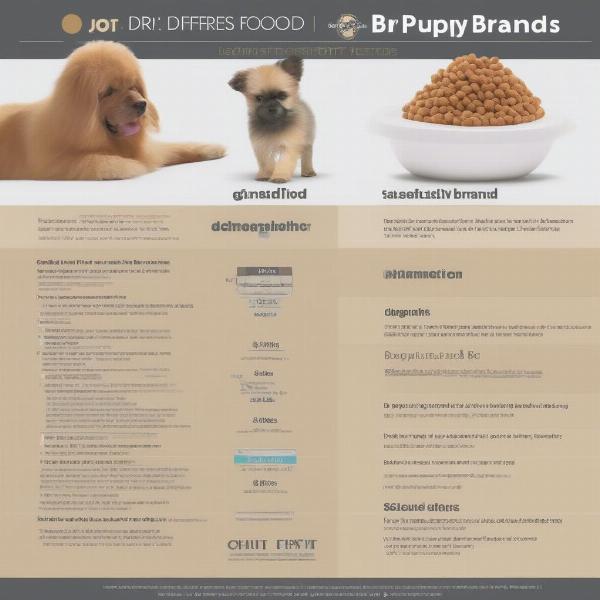Dr. John dog food for puppies is a popular choice for new pet owners, but is it the right choice for your puppy? This guide will delve into the details of Dr. John puppy food, examining its ingredients, nutritional value, and suitability for different breeds and developmental stages. We’ll explore the pros and cons, compare it to other leading brands, and equip you with the knowledge to make an informed decision about your puppy’s nutrition.
Understanding Your Puppy’s Nutritional Needs
Puppies, unlike adult dogs, have specific dietary requirements to support their rapid growth and development. They need a higher concentration of protein, fat, and essential vitamins and minerals to build strong bones, muscles, and a healthy immune system. Choosing the right food is crucial for laying the foundation for a long and healthy life. But with so many options available, how do you know which one is best?
What are the key nutrients to look for? Protein sources should be high-quality and easily digestible, like chicken, lamb, or fish. Healthy fats, such as omega-3 and omega-6 fatty acids, are essential for brain development and a shiny coat. Calcium and phosphorus are vital for bone growth, while vitamins and minerals support overall health and well-being.
Is Dr. John Dog Food Right for Your Puppy?
Dr. John dog food for puppies offers a range of formulas tailored to different breeds and sizes. Some formulas focus on large breed puppies, providing controlled calcium levels to support healthy joint development. Others cater to small breeds with smaller kibble sizes and higher calorie density to meet their energetic needs. Let’s explore the pros and cons of choosing Dr. John.
Pros:
- Variety of Formulas: Dr. John provides options for different breeds, sizes, and life stages.
- High-Quality Protein Sources: Many formulas feature real meat and poultry as the primary ingredients.
- Added Vitamins and Minerals: Dr. John often includes essential vitamins and minerals to support puppy development.
Cons:
- Price Point: Dr. John can be more expensive than some other brands.
- Potential for Allergens: Some formulas may contain ingredients that could trigger allergies in sensitive puppies.
 Comparing Dr. John to Other Puppy Foods
Comparing Dr. John to Other Puppy Foods
Dr. John Puppy Food: Ingredients Breakdown
A close look at the ingredient list of any dog food is essential. What exactly is your puppy eating? Dr. John typically uses real meat and poultry as the primary protein sources, which is a positive sign. However, it’s important to examine the other ingredients as well. Look for whole grains, fruits, and vegetables, which provide essential nutrients and fiber. Avoid artificial colors, flavors, and preservatives, as these can be harmful to your puppy’s health.
What about fillers? Some fillers, like corn and wheat, can be difficult for puppies to digest and may contribute to allergies. Look for formulas that prioritize whole, natural ingredients.
Transitioning Your Puppy to Dr. John
If you decide to switch your puppy to Dr. John dog food, it’s important to do so gradually. A sudden change in diet can upset your puppy’s stomach and lead to digestive issues. Start by mixing a small amount of Dr. John with your puppy’s current food. Gradually increase the proportion of Dr. John over several days until your puppy is eating it exclusively.
Conclusion
Choosing the right food for your puppy is a crucial decision. Dr. John dog food for puppies offers a range of formulas with high-quality protein sources and added vitamins and minerals. However, it’s important to consider your puppy’s individual needs, potential allergies, and budget. By carefully examining the ingredients, comparing different brands, and transitioning your puppy gradually, you can help ensure that they receive the best possible nutrition for a healthy and happy start to life.
FAQ
- How much Dr. John puppy food should I feed my puppy? Refer to the feeding guide on the back of the bag, which provides recommendations based on weight and age.
- What if my puppy has allergies? Consult your veterinarian and consider a hypoallergenic formula.
- Where can I buy Dr. John puppy food? It’s typically available at pet stores and online retailers.
- Is Dr. John a good choice for large breed puppies? Yes, they offer specific formulas for large breeds.
- Can I mix Dr. John with other puppy foods? It’s best to consult your veterinarian before mixing different brands.
- What are the signs of a food allergy in puppies? Common signs include itching, skin rashes, vomiting, and diarrhea.
- How long does it take to transition a puppy to a new food? A gradual transition over 7-10 days is recommended.
About ILM Dog: ILM Dog is your trusted resource for expert advice on dog care and nutrition. We provide comprehensive information on dog breeds, health, training, and much more. Whether you’re a new puppy owner or a seasoned dog lover, we’re here to help you navigate every aspect of dog ownership. Contact us at [email protected] or +44 20-3965-8624 for personalized advice.